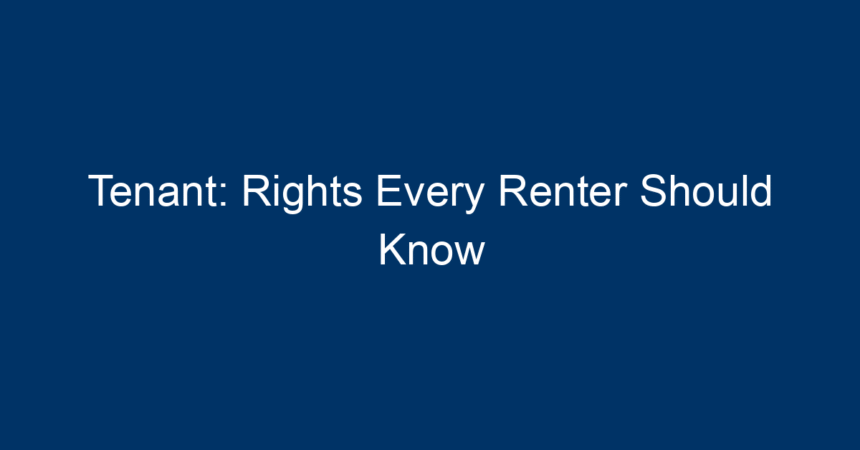Renting a home can often feel like a complex web of rules, regulations, and responsibilities. Understanding your rights as a tenant is crucial not only for your peace of mind but also for ensuring you are treated fairly. Whether you are a first-time renter or have moved around frequently, knowing what you are entitled to can save you time, money, and stress. This article delves into the fundamental rights every tenant should know, equipping you with the information you need to navigate your rental experience confidently.
Understanding Tenancy
Before diving into tenant rights, it’s essential to grasp the basics of what a tenancy agreement entails. A tenancy agreement is a contract between the landlord and the tenant, outlining the terms of renting a property. This document typically covers the rental period, payment terms, maintenance responsibilities, and conditions for terminating the lease.
Types of Tenancies
- Fixed-Term Tenancy: This agreement lasts for a specified period (e.g., six months or a year).
- Periodic Tenancy: This agreement renews automatically after a certain period (e.g., month-to-month).
- Tenancy at Will: This arrangement can be terminated by either party at any time.
Having a clear understanding of your tenancy type sets the foundation for better knowledge of your rights.
Key Tenant Rights
1. Right to a Safe and Habitable Living Environment
One of the most critical rights every tenant should know about is the right to a safe and habitable living space. Landlords are legally obligated to ensure that rental properties meet health and safety standards. This includes:
- Structural Integrity: Properly maintained walls, roofs, and foundations.
- Utilities: Functioning heating, plumbing, and electrical systems.
- Pest Control: The absence of mold, rodents, or other pests.
If your living environment is unsafe or uninhabitable, you have the right to report these issues to local housing authorities. Depending on your jurisdiction, you may even have the right to withhold rent until necessary repairs are made.
2. Right to Privacy
As a tenant, you have the right to privacy in your rental unit. Your landlord cannot enter your home without proper notice, except in emergencies. Typically, landlords must provide at least 24 hours’ notice before entering, although laws can vary by state or region. This right helps foster a sense of security in your living environment.
3. Right to Fair Treatment
Fair housing laws protect tenants against discrimination. It is illegal for landlords to deny housing based on race, color, religion, sex, national origin, disability, or familial status. If you suspect discrimination, document any interactions and consider contacting a local housing authority or legal aid organization to discuss your situation.
4. Right to Due Process
If a landlord wishes to evict you, they must follow legal procedures, which typically involve providing written notice and a chance to respond to the eviction claim. Ensure that the notice includes essential details such as:
- The reason for eviction
- The time frame you have to rectify the situation (if applicable)
Failure to follow these procedures often results in a wrongful eviction, giving you a valid reason to contest it.
5. Right to Code Compliance
Landlords must comply with local housing codes and regulations. This includes maintaining the property in accordance with state and local laws. If a landlord neglects necessary repairs, tenants may have grounds to file a complaint with local housing authorities or even pursue legal action.
6. Right to a Security Deposit
Upon moving in, most landlords will request a security deposit, typically equivalent to one month’s rent. You have the right to:
- A written explanation of how the deposit will be used.
- The return of your security deposit, minus legitimate deductions for damages beyond normal wear and tear, within a specified time frame.
- A detailed itemization of any deductions taken from your deposit.
Understanding your rights regarding security deposits can prevent unfair charges when you move out.
7. Right to Challenge Rent Increases
Most rental agreements stipulate how much rent can be increased and when. For example, a landlord may not be able to raise rent during a fixed-term lease without justification. Always check your local landlord-tenant laws to understand the legality of rent increases in your area.
8. Right to Organize
Tenants have the right to organize and form tenants’ unions or associations. This enables you and your neighbors to advocate collectively for better living conditions, negotiate lease terms, or address grievances with your landlord.
Recommended Actions for Tenants
Understanding your rights is a crucial first step, but taking the following actions can empower you even more:
Keep Records
Always maintain detailed records of communication with your landlord. Document repair requests, rent payments, and any correspondence regarding your tenancy. This documentation can be vital in resolving disputes should they arise.
Familiarize Yourself with Local Laws
Tenant laws can vary significantly by state and municipality. Familiarize yourself with local rental laws and regulations to ensure you know your rights and responsibilities.
Seek Legal Help
If you believe your rights as a tenant have been violated, don’t hesitate to seek legal assistance. Many areas offer free or low-cost legal services to help renters address issues related to housing rights and disputes.
Communicate Openly
Maintain open lines of communication with your landlord. If you encounter issues in your rental unit or have concerns about your rights, discuss them directly with your landlord before escalating the situation. Many problems can be resolved through clear and respectful dialogue.
Conclusion
Understanding your rights as a tenant is essential for creating a positive and stress-free renting experience. From ensuring a safe living environment to knowing your rights regarding privacy and rent increases, knowledge is your best ally. Familiarize yourself with your local laws, document your interactions, and communicate openly with your landlord. By doing so, you position yourself as a well-informed tenant who can navigate the rental landscape with confidence. Remember, being a tenant doesn’t mean relinquishing your rights—educating yourself on these matters empowers you to advocate for a safe, fair, and enjoyable living experience.




